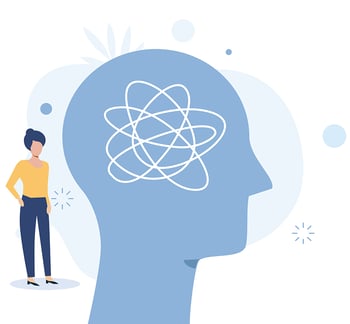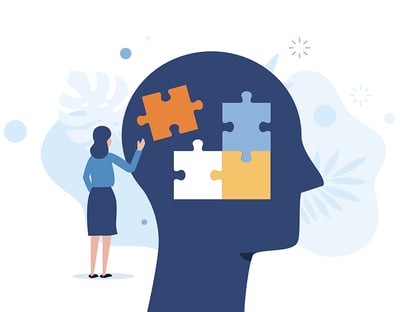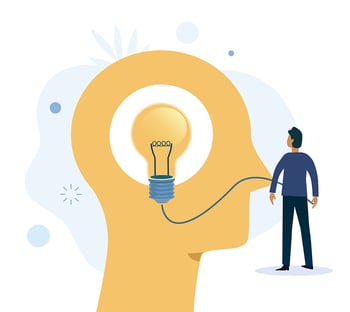Fostering First-Year Experience Excellence - In this article guest author Dr. Laurie Hazard shares her views to support students and deliver effective First-Year-Experience programs on campus. For more FYE resources, check out some of our recent webinars, including 'Mastering Executive Functioning Skills: A Key To Academic Success' featuring Dr. Laurie Hazard.
Don’t Always Believe What You Think: Dispelling the Myth of Traditional Intelligence and Its Influence on College Success
Introduction
Cognitive psychologists study how we think—our “internal mental processes”, how we interpret them to make sense of the world around us, and how we decide on what behaviors to enact based on those internal mental processes. Cognitive psychologists argue that our thoughts have a powerful influence over our behaviors—a concept vital to first-year students in College Success and FYE Programs.
Take a college student who has always believed that they’re “not good at math.” Cognitive psychologists would say that if a student believes they’re not good at a certain subject, they’re much less likely to seek out help in that subject. In other words, they won’t enact behaviors to be successful. The student’s reasoning (internal mental processes) might sound something like, “I’ve always been bad at math. In fact, my dad was horrible at math, too. I was born with a faulty math gene! Why should I bother to go see tutors or my professors? They can’t help.”
Not so fast. How we think can certainly influence how we behave, but we shouldn’t always trust the voice inside our heads.
A student may think they were born with a certain amount of intelligence and no matter how they behave—in this case, study—, they can never change the fate that was bestowed upon them. Consider how their education and self-esteem would differ if they silenced that belief and instead thought, “Through hard work and effort, I can hone any skill, including math.”
Most first-year college students haven’t given much thought to how these mental processes translate into behaviors, or how transforming those thoughts might contribute to their success. They may ask themselves, “Am I smart enough to be here?” This reinforces the assumption that intelligence is fixed when you are born, aligning with the view of traditional IQ.
Dispelling the Myth of Traditional IQ
Historically, intelligence has been quantified through Intelligence Quotient (IQ) tests like the Weschler Adult Intelligence Scale (WAIS). Students familiar with the Scholastic Aptitude Test (SAT) might be surprised to find out that it’s not necessarily the best predictor of college success. It’s important for students to understand that the SAT test only assesses logical-mathematical and linguistic abilities while ignoring other significant aspects of intelligence.
In fact, standardized SAT and IQ tests have long been criticized for their narrow definitions of intelligence.
For decades, scholars have debated the nature of intelligence, its ability to be tested, and how it all impacts academic success. Since the 1960s, there has been a growing focus on the role of personality traits and attitudes in relation to academic achievement and intelligence, prompting educators to challenge conventional notions of intelligence.
More Comprehensive Theories of Intelligence
Many alternative theories propose a broader understanding of intelligence. In her influential 2007 book, "Mindset: The New Psychology of Success", Carol Dweck identifies a common mental roadblock to “intelligence”, and how we might combat it by adjusting our thought processes.
The “fixed mindset” reinforces the idea that certain qualities like intelligence are unchangeable, Dweck asserting that many of us are instilled with this mentality from a young age. On the opposite end of the spectrum lies the “growth mindset”, rooted in a belief that skills and intellectual qualities can be nurtured through personal effort. If you embrace the growth mindset, you approach life with the conviction that personal development is attainable through hard work and dedication.
First Year Experience and College Success instructors, academic coaches, learning specialists, and academic advisors play a pivotal role in expanding students' perspectives on intelligence. We can explore concepts such as Growth Mindset, the Theory of Multiple Intelligences, Emotional Intelligence (EQ), and Cultural Intelligence (CQ) through FYE and College Success materials, broadening student understanding of what it means to be intelligent from the get-go. Providing these types of resources can boost students’ self-confidence and equip them with the skills and behaviors needed for success in college and beyond.

Dweck’s Growth Mindset Theory: It’s All About Attitude
In their early research, Dweck and Leggett (1988) proposed that one’s attitude toward intelligence is a reliable indicator of one’s behaviors, particularly when it comes to effective study habits. They argued that people hold one of two basic viewpoints on intelligence: an “entity view” or an “incremental view”. People with an entity view believe that intelligence is a fixed ability and the sole determinant of performance; in their eyes, effort has nothing to do with it. Conversely, people who hold an incremental view believe that intelligence involves a set of skills that can be improved through effort.
Building upon Dweck and Leggett’s foundational study of mindset and its influence on study skills, subsequent research has found that college students with an incremental view of intelligence tend to work harder, exhibit a stronger use of study skills, and overall engage in more positive academic behaviors compared to students with an entity view (Jones, Slate, Marini, & DeWater, 1993). More specifically, Jones et al.’s study in 1993 found that, compared to students with an entity view, students with an incremental view of intelligence are more likely to complete reading and written assignments ahead of time, less likely to engage in rote memorization, less likely to daydream in class, and overall, more willing to exert academic effort.
This idea that attitudes toward intelligence influence our academic habits and behaviors expands upon Dweck and Leggett's 1988 research, which found that an individual’s view of intelligence creates frameworks within which they interpret and react to events, like an upcoming exam. Consider the earlier example related to math—those with an entity view reacted through helplessness, thinking, “Why bother to study for my exam? I’ve always been bad at math.” On the other hand, students who have an incremental view might face challenges with confidence and persevere in the face of failure, thinking, “Given that I failed my last math quiz, I better find a tutor who can help me do better.”
So, when a student asks themselves, “Am I smart enough to be here?”, there’s a difference between being intelligent and acting intelligently. A student could have the highest IQ on campus, but if they aren’t operating under a growth mindset, they’ll hit a plateau of success. Meanwhile, with some diligence and a conscious effort to study, a student with a lower IQ and a strong growth mindset could soar past the first student academically.
Research has linked growth mindsets to higher grade point averages and increased use of college-level study strategies. This highlights the exciting potential for FYE and College Success instructors to drive positive change at the ground level of students’ college careers.

Gardner’s Theory of Multiple Intelligences
Like Dweck, Gardner’s work in 1983 challenged traditional views of intelligence. The Theory of Multiple Intelligences, or “MI theory”, was among one of the first to challenge the idea that intelligence is a single capacity that equips a person to deal with various situations. He instead argues that people use at least eight autonomous intellectual capacities, all with their own distinctive functions: linguistic, musical, logical-mathematical, spatial, bodily-kinesthetic, interpersonal, intrapersonal, and naturalist. According to Gardner, intelligence entails a set of problem-solving skills, all of which work together in their own unique ways.
To enforce his point, Gardner describes a twelve-year-old boy, Puluwat, in the Caroline Islands who has mastered sailing. Under the tutelage of master navigators, the boy learns to combine the knowledge of sailing, stars, and geography to find his way around hundreds of islands. The boy exhibits a high level of competence in a challenging field and should, Gardner argues, be viewed as exhibiting intelligent behavior.
The research on student success, along with Gardner’s 1983 Theory of Multiple Intelligences, has received a great deal of attention in the field of education, sparking debate over what factors contribute to and predict student achievement. Considering MI theory, it goes without saying that students need logical-mathematical and linguistic intelligence to be successful in college and when taking standardized tests.
But let’s consider another intellectual capacity Gardner identified: intrapersonal intelligence, or the capacity to get to know yourself well. Those high in intrapersonal intelligence are acutely attuned to their inner worlds, masters of their own thoughts and feelings.
Instructors have an opportunity to provide FYE materials that encourage students to self-reflect and deeply consider how their thoughts, feelings, and behaviors can affect college success. By incorporating these resources into first-year College Success programs, professors can encourage the development of intrapersonal skills as a realistic and achievable objective for all students, one whose benefits extend beyond their time on campus.
Simply put, if you believe you can do it, you can!
Goleman’s Theory of Emotional Intelligence
Intrapersonal intelligence is more than just a dimension of MI theory—it’s also a component of Emotional Intelligence (EQ). In 1995, Daniel Goleman’s research shifted our culture’s interest from IQ to EQ, which defines the qualities shared by high achievers: self-awareness, impulse control, persistence, empathy, social skills, and self-motivation.
“Self-awareness” is another way of phrasing “intrapersonal intelligence”. Students might consider their EQ level by asking themselves questions like, “How well-developed is my impulse control or my ability to self-motivate?” Goleman’s work is based on that of the Stanford psychologist Albert Bandura, who offered insight into a concept called self-efficacy, or the belief that one can produce desired results, such as mastering new skills or achieving personal goals. Simply put, if you believe you can do it, you can.
This reinforces the idea that one’s belief system affects one’s ability to be successful, a concept crucial to college success. Consider how first-year students might feel entering higher education—perhaps insecure about their own ability to meet expectations, manage their time, and reach their goals. FYE programs should seek to build student self-efficacy, which can be done in part by analyzing the relationship between students’ current study habits and what’s been taught to them (Jones, Slate, Marini, & DeWater, 1993). If students believe that the new study habits they learn will produce desired results, and recognize this as a result of their own efforts, they’ll be more confident to use those new strategies, leading to better grades.
College Success and First Year Experience programs have the power to teach students how to nurture this level of emotional intelligence, emphasizing self-efficacy as the key to academic success in a college environment.

Livermore’s Theory of Cultural Intelligence
First-year college students report positive experiences from learning on a diverse campus. It encourages them to reflect on their existing ideals and reconsider their worldview. Students grow and change when they experience different cultures first-hand. As they start their first year of college, students encounter a diverse range of people in their daily interactions, including staff and students from different cultures, religious beliefs, sexual orientations, ages, and physical abilities. This new level of diversity provides opportunities to learn from others with vastly different perspectives, giving students an opportunity to develop new interpersonal skills and hone their Cultural Intelligence (CQ).
David Livermore (2015) challenged us to think about CQ, a set of skills that can be developed to help students learn how to succeed in a multicultural global market. These skills determine the degree to which individuals function effectively across a variety of cultural contexts (national, ethnic, and organizational contexts).
CQ Skills:
- CQ Drive: Your level of interest, persistence, and confidence during multicultural interactions.
- CQ Knowledge: Your understanding of how cultures are similar and different.
- CQ Strategy: Your awareness and ability to plan for multicultural interactions.
- CQ Action/Behavior: Your ability to adapt when relating and working in multicultural contexts.
Learning in a diverse student body can be exciting, but also intimidating. Discussing Cultural Intelligence with students in FYE courses can offer an entrée into a conversation about diversity while also highlighting that there is so much more to intelligence than traditional IQ. How much a student will benefit from diverse interactions in college depends on their ability to adjust culturally and develop their CQ skills. Students might especially want to develop their CQ skills before they study abroad.
As College Success faculty members and administrators, we can help support our students’ cultural intelligence in many ways. For example:
- Encourage them to be accepting and welcoming of differences.
- In conversations, ask about the new people they’ve met.
- Create experiences for students to meet new people and participate in new activities.
- Model your own interest and curiosity to learn about other cultures.
Closing Statement
Not enough first-year experience courses and College Success programs take the time to address the various theories of intelligence, leaving students to believe what they’ve always thought: if they didn’t do great on their SATs, then they must not be that smart. Challenge students to think of those with similar academic records—identical admissions credentials, the same SAT scores, and the same high school grades. If student can’t get motivated to do the required work, whereas the other has a strong sense of self-efficacy, with a well-established daily routine for studying, who is more likely to achieve academically?
Helping students recognize that their thoughts, feelings, and personality factors contribute to college success can be a life-changing experience. When we make a conscious effort to broaden students’ concept of intelligence, they begin to see these skills and qualities in themselves, building confidence in their own intelligence and capacity for growth, both academically and personally.
As FYE specialists, it’s our job to let students know they’re capable of achieving their academic goals, no matter how intelligent they think they are.
About the Author
Dr. Laurie L. Hazard, Ed.D.
Founder, Recognize Your Potential
Educator, Counselor, Student Success Expert
www.lauriehazard.com
www.Offtoseries.com
Laurie Hazard is an award-winning educator and nationally recognized student success expert who researches how students make successful transitions from secondary to higher education. She studies and writes about student personality types, academic achievement, and classroom success. For more information on Laurie's speaking, writing, and consulting: www.lauriehazard.com.
